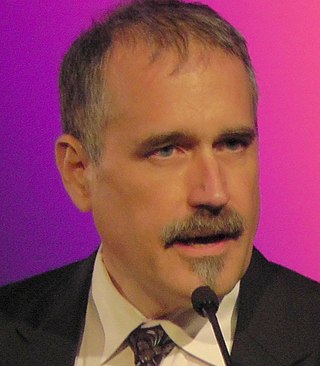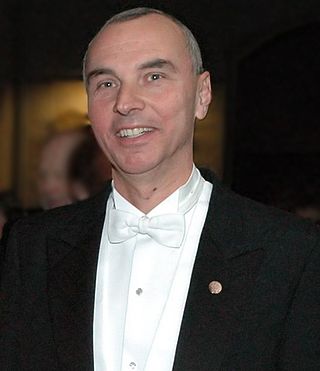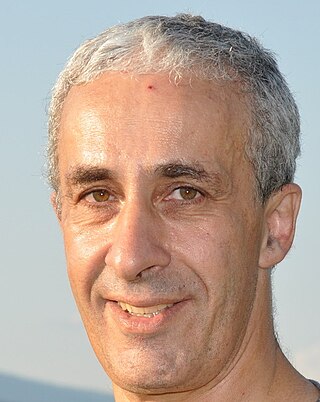
The École polytechnique fédérale de Lausanne is a public research university in Lausanne, Switzerland. Established in 1969, EPFL has placed itself as a public research university specializing in engineering and natural sciences.
Lawrence R. Rabiner is an electrical engineer working in the fields of digital signal processing and speech processing; in particular in digital signal processing for automatic speech recognition. He has worked on systems for AT&T Corporation for speech recognition.

Thomas Wiegand is a German electrical engineer who substantially contributed to the creation of the H.264/AVC, H.265/HEVC, and H.266/VVC video coding standards. For H.264/AVC, Wiegand was one of the chairmen of the Joint Video Team (JVT) standardization committee that created the standard and was the chief editor of the standard itself. He was also a very active technical contributor to the H.264/AVC, H.265/HEVC, and H.266/VVC video coding standards. Wiegand also holds a chairmanship position in the ITU-T VCEG of ITU-T Study Group 16 and previously in ISO/IEC MPEG standardization organizations. In July 2006, video coding work of the ITU-T was jointly led by Gary J. Sullivan and Wiegand for the preceding six years. It was voted as the most influential area of the standardization work of the CCITT and ITU-T in their 50-year history. Since 2018, Wiegand has served as chair of the ITU/WHO Focus Group on Artificial Intelligence for Health (FG-AI4H). Since 2014, Thomson Reuters named Wiegand in their list of “The World’s Most Influential Scientific Minds” as one of the most cited researchers in his field.
EURASIP Journal on Advances in Signal Processing is a peer-reviewed open access scientific journal covering theoretical and practical aspects of signal processing in new and emerging technologies. The scope includes: communications, networking, sensors and actuators, radar and sonar, medical imaging, biomedical applications, remote sensing, consumer electronics, computer vision, pattern recognition, robotics, fiber optic sensing/transducers, industrial automation, transportation, stock market and financial analysis, seismography, and avionics.

Martin Vetterli is the current president of École polytechnique fédérale de Lausanne (EPFL) in Switzerland, succeeding Patrick Aebischer. He's a professor of engineering and was formerly the president of the National Research Council of the Swiss National Science Foundation.
Ali H. Sayed is the dean of engineering at EPFL, where he teaches and conducts research on Adaptation, Learning, Statistical Signal Processing, and Signal Processing for Communications. He is the Director of the EPFL Adaptive Systems Laboratory. He has authored several books on estimation and filtering theories, including the textbook Adaptive Filters, published by Wiley & Sons in 2008. Professor Sayed received the degrees of Engineer and Master of Science in Electrical Engineering from the University of Sao Paulo, Brazil, in 1987 and 1989, respectively, and the Doctor of Philosophy degree in electrical engineering from Stanford University in 1992.

Alan Conrad Bovik is an American engineer, vision scientist, and educator. He is a professor at the University of Texas at Austin (UT-Austin), where he holds the Cockrell Family Regents Endowed Chair in the Cockrell School of Engineering and is Director of the Laboratory for Image and Video Engineering (LIVE). He is a faculty member in the UT-Austin Department of Electrical and Computer Engineering, the Machine Learning Laboratory, the Institute for Neuroscience, and the Wireless Networking and Communications Group.
Adrian (Mihai) Ionescu is a full Professor at the Swiss Federal Institute of Technology in Lausanne (EPFL) on a special contract.

Peter (Petre) Stoica is a researcher and educator in the field of signal processing and its applications to radar/sonar, communications and bio-medicine. He is a professor of Signals and Systems Modeling at Uppsala University in Sweden, and a Member of the Royal Swedish Academy of Engineering Sciences, the United States National Academy of Engineering (International Member), the Romanian Academy, the European Academy of Sciences, and the Royal Society of Sciences. He is also a Fellow of IEEE, EURASIP, IETI, and the Royal Statistical Society.

Robert W. Heath Jr. is an American electrical engineer, researcher, educator, wireless technology expert, and a Lampe Distinguished Professor in the Department of Electrical and Computer Engineering at the North Carolina State University. He is also the president and CEO of MIMO Wireless Inc. He was the founding director of the Situation Aware Vehicular Engineering Systems initiative.
Farhad Rachidi is an Iranian-Swiss scientist.

David Atienza Alonso is a Spanish/Swiss scientist in the disciplines of computer and electrical engineering. His research focuses on hardware‐software co‐design and management for energy‐efficient and thermal-aware computing systems, always starting from a system‐level perspective to the actual electronic design. He is a full professor of electrical and computer engineering at the Swiss Federal Institute of Technology in Lausanne (EPFL) and the head of the Embedded Systems Laboratory (ESL). He is an IEEE Fellow (2016), and an ACM Fellow (2022).

Pascal Fua is a computer science professor at EPFL. He received an engineering degree from École Polytechnique, Paris, in 1984 and a Ph.D. in computer science from the University of Orsay in 1989. He joined EPFL in 1996. Before that, he worked at SRI International and at INRIA Sophia-Antipolis as a computer scientist.
The European Association for Signal Processing (EURASIP) is an international scientific society for the theory and application of signal processing. It was established on the 1st of September 1978.It hosts the European Signal Processing Conference (EUSIPCO), which has been held annually since 1993 in various European locations. It publishes a series of science journals, as EURASIP Journal on Advances in Signal Processing, that have also an open access policy.

Moeness G. Amin is an Egyptian-American professor and engineer. Amin is the director of the Center for Advanced Communications and a professor in the Department of Electrical and Computer Engineering at Villanova University.
Jiebo Luo is a Chinese-American computer scientist, the Albert Arendt Hopeman Professor of Engineering and Professor of Computer Science at the University of Rochester. He is interested in artificial intelligence, data science and computer vision.

Michael Unser (born April 9, 1958 in Zug, Switzerland) is a Swiss engineer and a professor at the École Polytechnique Fédérale de Lausanne (EPFL). His research focuses on the field of biomedical image processing.

Dimitri Van De Ville is a Swiss and Belgian computer scientist and neuroscientist specialized in dynamical and network aspects of brain activity. He is a professor of bioengineering at EPFL and the head of the Medical Image Processing Laboratory at EPFL's School of Engineering.

Mário A. T. Figueiredo is a Portuguese engineer, academic, and researcher. He is an IST Distinguished Professor and holds the Feedzai chair of machine learning at IST, University of Lisbon.
Srdjan Stankovic is a Montenegrin scientist and the full professor at the Faculty of electrical engineering, University of Montenegro.












